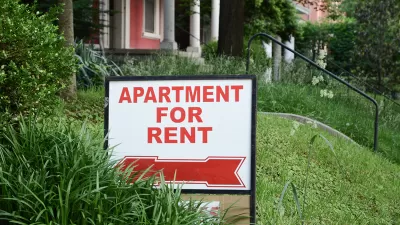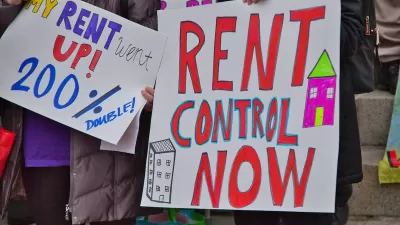Rent control policies, widely panned by economists, have been shown to slow displacement and keep housing affordable.

For decades, rent control policies have earned the ire of economists, who argue that rent control is bad “because rent control is a price control, and price controls artificially distort well-functioning markets, resulting in a mismatch between supply and demand and the creation of the dreaded deadweight loss triangle all budding economist learn about.”
But, Mark Paul asks in The American Prospect, why should renters not be afforded the same privilege as more than half of Americans—namely, those who “enjoy de facto rent control in the form of the 30-year mortgage”?
Paul writes that there’s a problem with the traditional thinking about rent control in economist circles: it doesn’t hold up. “As recent empirical work has shown, the neoclassical account’s core assumptions—one, that rent control restricts the supply of new housing; and two, that it misallocates existing housing, thereby causing an irrecoverable collective loss—fail to hold when it comes to the real world.” Paul explains that “abundant evidence” shows that rent control does not constrain housing supply, and there is no housing boom when rent control laws are repealed.
Rent control can also slow the tide of gentrification and displacement when neighborhoods grow in popularity and value. “It helps turn housing from a nexus of profit to one of community, family, and social space.” Moreover, rent control has broad popular support. “Polling conducted in 2019 by Data for Progress found that a majority of likely voters, including a majority of independents, support rent control, with just 1 in 5 opposing such a measure.”
It’s also a matter of equity: “Homeowners, who skew white and rich, benefit tremendously from the government’s rules, regulations, and subsidies that allow them to pay a fixed monthly sum for housing over 30 years. It’s high time for the government to extend these benefits—and the economic security that comes with them—by adopting rent control to cover all people in the United States.”
FULL STORY: Economists Hate Rent Control. Here’s Why They’re Wrong.

Study: Maui’s Plan to Convert Vacation Rentals to Long-Term Housing Could Cause Nearly $1 Billion Economic Loss
The plan would reduce visitor accommodation by 25,% resulting in 1,900 jobs lost.

North Texas Transit Leaders Tout Benefits of TOD for Growing Region
At a summit focused on transit-oriented development, policymakers discussed how North Texas’ expanded light rail system can serve as a tool for economic growth.

Using Old Oil and Gas Wells for Green Energy Storage
Penn State researchers have found that repurposing abandoned oil and gas wells for geothermal-assisted compressed-air energy storage can boost efficiency, reduce environmental risks, and support clean energy and job transitions.

Santa Barbara Could Build Housing on County Land
County supervisors moved forward a proposal to build workforce housing on two county-owned parcels.

San Mateo Formally Opposes Freeway Project
The city council will send a letter to Caltrans urging the agency to reconsider a plan to expand the 101 through the city of San Mateo.

A Bronx Community Fights to Have its Voice Heard
After organizing and giving input for decades, the community around the Kingsbridge Armory might actually see it redeveloped — and they want to continue to have a say in how it goes.
Urban Design for Planners 1: Software Tools
This six-course series explores essential urban design concepts using open source software and equips planners with the tools they need to participate fully in the urban design process.
Planning for Universal Design
Learn the tools for implementing Universal Design in planning regulations.
Ascent Environmental
Borough of Carlisle
Institute for Housing and Urban Development Studies (IHS)
City of Grandview
Harvard GSD Executive Education
Toledo-Lucas County Plan Commissions
Salt Lake City
NYU Wagner Graduate School of Public Service





























